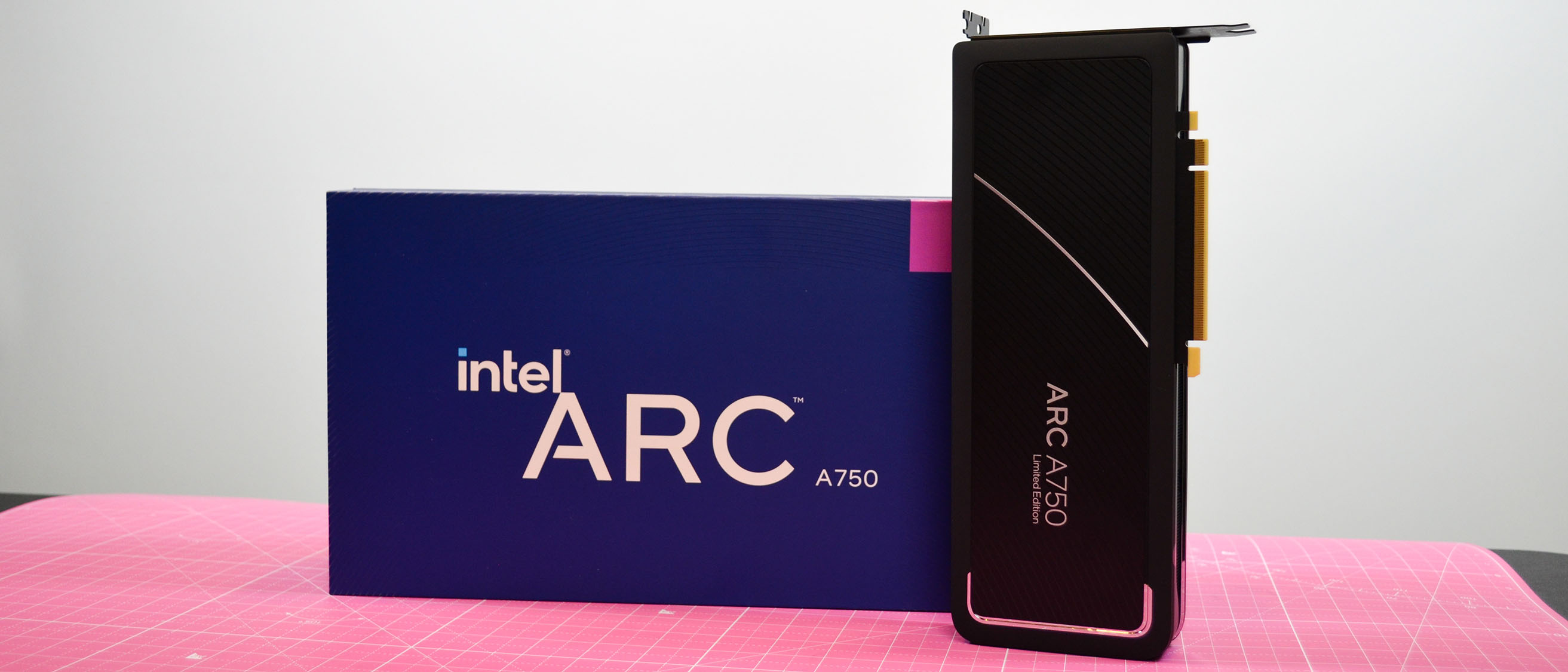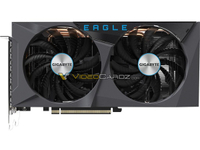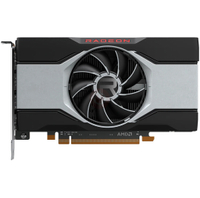TechRadar Verdict
While the Intel Arc A750 might not have knocked it out of the park, it shows more than enough hussle to make me optimistic about the future of Intel's Arc graphics cards. For the price, you're getting some really great 1080p performance — when it works.
Pros
- +
Great 1080p performance
- +
Stellar design
- +
Fantastic price
- +
Surprisingly strong ray tracing and upscaling tech
Cons
- -
Has trouble with older games
- -
Some modern games won't play
- -
Not very power efficient
- -
Rather large for a budget card
Why you can trust TechRadar
Intel Arc A750: Two-minute review
The Intel Arc A750 is probably the one graphics card I've most wanted to get my hands on this year, and now that I've put it through a fairly rigorous testing regime, I can honestly say I am very impressed with Intel's first effort at a discrete GPU. At the same time, it's also not an easy card to recommend right now, which is a tragedy.
First, to the good, namely the great price and stylish look of the Intel Limited Edition reference card. The Intel Arc A750 Limited Edition card has an MSRP of just $249.99 (about £200 / AU$375), and the limited number of third-party cards out there are retailing at roughly the same price.
The Arc A750 I tested also looks spectacular compared to the reference cards from Nvidia and AMD, thanks to its matte black look, subtle lighting, and silver trim along the edge of the card. It will look great in a case, especially for those who don't need their PCs to look like a carnival.
When it comes to performance, I was most surprised by how the Arc A750 handled modern AAA games like Cyberpunk 2077 and Returnal, both of which put a lot of demands on a graphics card in order to maintain a stable frame rate. The Arc A750 handled them much better than the RTX 3050 it is ostensibly competing against. It even outperformed the RTX 3060 in many cases, putting it just under halfway between the RTX 3060 and the RTX 3060 Ti, two of the best graphics cards ever made.
The Arc A750 manages to pull this off while costing substantially less, which is definitely a huge point in its column.
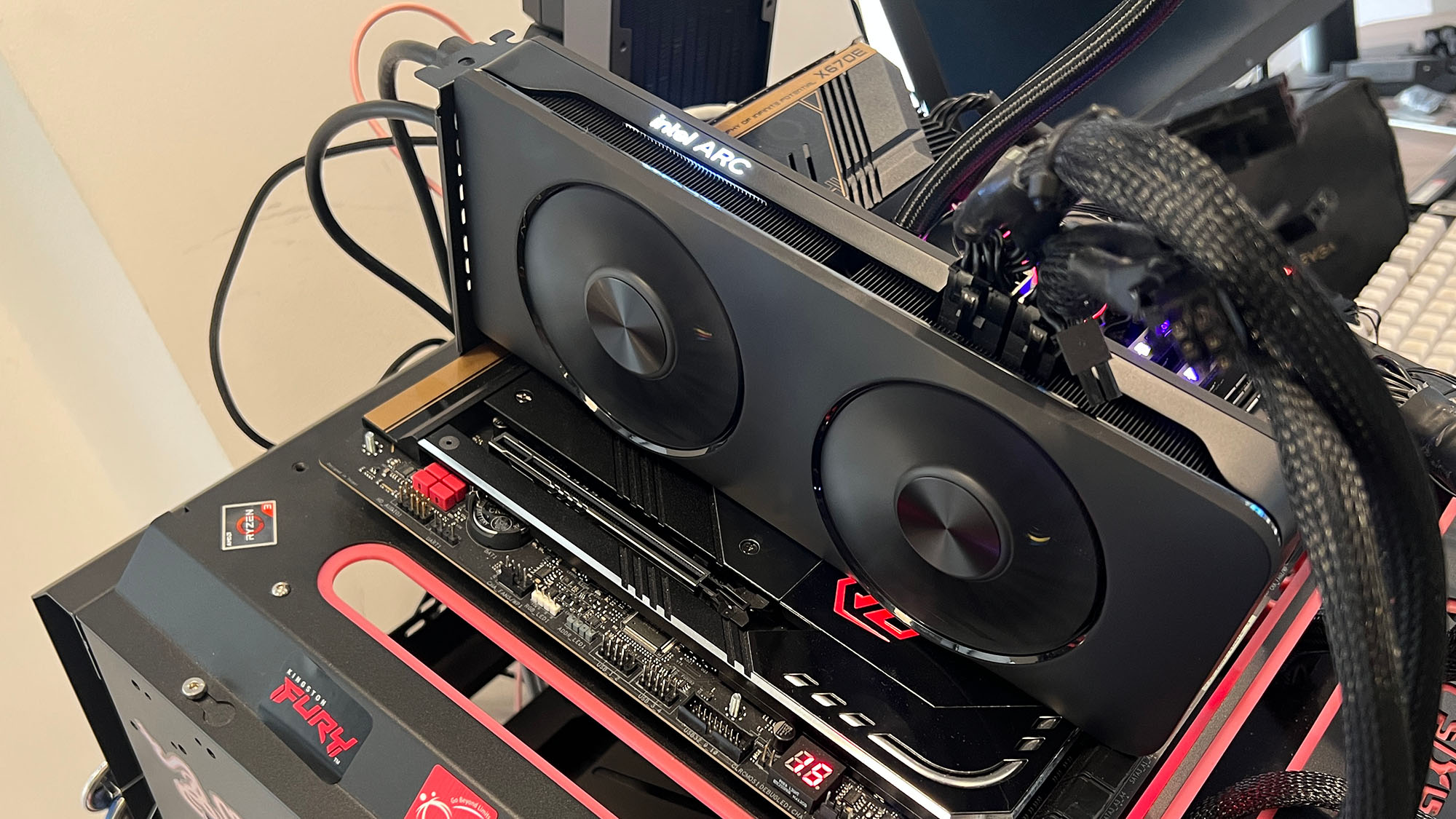
| Header Cell - Column 0 | Intel Arc A750 | Nvidia GeForce RTX 3060 | AMD Radeon RX 6600 |
|---|---|---|---|
| 3DMark Firestrike | 31,330 | 22,732 | 24,190 |
| 3DMark Nightraid | 127,774 | 108,208 | 112,034 |
| 3DMark Speedway | 2,371 | 2,182 | 1,461 |
| 3DMark Port Royal | 6,667 | 5,156 | 4,135 |
| 3DMark Time Spy | 12,688 | 8,777 | 8,316 |
| 3DMark Firestrike Extreme | 14,606 | 10,609 | 11,070 |
| 3DMark Time Spy Extreme | 6,160 | 4,100 | 3,788 |
| 3DMark Firestrike Ultra | 6,608 | 5,094 | 5,424 |
| 3DMark Wildlife Extreme | 22,189 | 17,410 | 14,866 |
| 3DMark Wildlife Extreme Unlimited | 23,012 | 17,330 | 14,900 |
| PassMark 3D | 9,766 | 20,786 | 20,084 |
| Total average performance | 23,924 | 20,216 | 20,024 |
This is the system we used to test the Intel Arc A750:
CPU: AMD Ryzen 9 7950X3D
CPU Cooler: Cougar Poseidon GT 360 AIO
RAM: 32GB Corsair Dominator Platinum @ 5,200MHz & 32GB G.Skill Trident Z5 Neo @ 5,200MHz
Motherboard: ASRock X670E Taichi
SSD: Samsung 980 Pro 1TB NVMe M.2 SSD
Power Supply: Corsair AX1000
Case: Praxis Wetbench
The thing about the Arc A750 is that the things it does well, it does really well, but those areas where it flounders, like older DirectX9 and DirectX10 workloads, it does so pretty badly.
It's a tale of two halves, really. Nothing exposes the issues with the Arc A750 more than its synthetic performance scores, which on average trounce the RTX 3060, 23,924 to 20,216. In that average though is its PassMark 3D score, a good measure of the card's ability to render content that wasn't just put out within the last couple of years. Here, the Arc A750 scored a dismal 9,766 to the RTX 3060's 20,786 - a 10,000 point deficit.
The story is similar when gaming, where the Arc A750 generally outperforms its rival cards, even in ray tracing in which Intel is the newcomer behind mature leader Nvidia and fiesty, determined AMD. In fact, when gaming with ray tracing at 1080p, the Intel Arc A750 comes in a close second behind Nvidia's RTX 3060 8GB, 37fps on average to the 3060's 44fps.
Bump that up to 1440p, however, and the Intel Arc A750 actually does better than the RTX 3060 8GB - 33fps on average to the 3060's 29fps average. When running Intel XeSS and Nvidia DLSS, the Arc A750 averages about 56fps on max settings with full ray tracing at 1080p, while the RX 6600 can only muster 46fps on average.
| Header Cell - Column 0 | Intel Arc A750 | Nvidia GeForce RTX 3060 | AMD Radeon RX 6600 |
|---|---|---|---|
| Metro: Exodus | 47 | 37 | 34 |
| F1 2022 | 107 | 147 | 147 |
| Total War: Warhammer III | 68 | 72 | 58 |
| Cyberpunk 2077 | 79 | 70 | 64 |
| Returnal | 72 | 70 | 68 |
| Tiny Tina's Wonderland | N/A | 60 | 60 |
| CS:GO | 400 | 498 | 555 |
| Average fps | 75 | 79 | 72 |
These are much lower than the RTX 3060's 77fps, thanks to DLSS, but getting roughly 60fps gaming with full ray tracing and max settings at 1080p is a hell of an accomplishment for the first generation of Intel discrete graphics. The Arc A750 can even run even with the AMD Radeon RX 6650 XT in ray tracing performance with upscaling at 1440p, getting 42fps on average.
If only this performance were consistent across every game, then there would be no question that the Intel Arc A750 is the best cheap graphics card on the market. But it is exactly that inconsistency that drags this card down. Some games, like Tiny Tina's Wonderland, won't even run on the Arc A750, and it really, really should. How many games are there out there like Tiny Tina's? It's impossible to say, which is the heartbreaking thing about this card.
I really can't recommend people drop $250 on a graphics card that might not play their favorite games. That is simply not a problem that AMD or Nvidia have. Their performance might be rough for a few days or weeks after a game launches, but the game plays. The same can't be said of the A750, and only you, the buyer, can decide if that is worth the risk.
In the end, the Intel Arc A750 is a journeyman blacksmith's work: showing enormous potential but not of enough quality to merit selling in the shop. Those pieces are how craftspeople learn to become great, and I can very clearly see the greatness that future Arc cards can achieve as Intel continues to work on lingering issues and partners with more game developers.
It's just not there yet. As Intel's drivers improve, a lot of these issues might fade away, and the Intel Arc A750 will grow into the formidable card it seems like it should be. If you're comfortable dropping this kind of cash and taking that chance, you will still find this card does a lot of things great and can serve as a bridge to Intel's next generation of cards, Arc Battlemage, due out in 2024.
Intel Arc A750 Price & availability
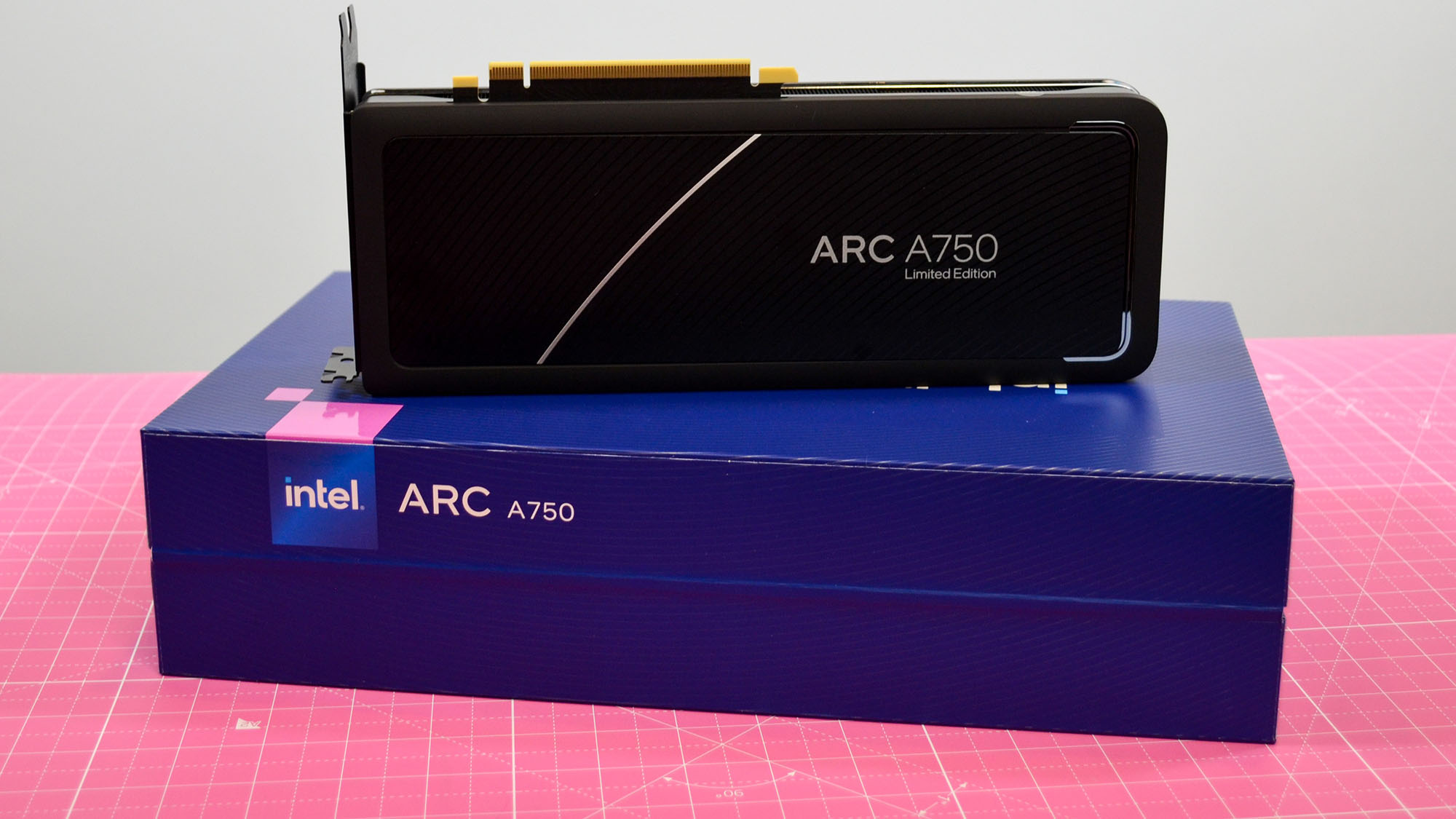
- How much does it cost? MSRP of $249.99 (about £200 / AU$375)
- When can you get it? It is available now
- Where can you get it? It is available in the US, UK, and Australia, but stock may be an issue
The Intel Arc A750 is available now, starting at $249.99 (about £200 / AU$375). There are a limited number of third-party partners who also make the A750, though these tend to sell at or very close to Intel's MSRP from what I've seen.
This puts the Arc A750 on the same level price-wise as the Nvidia RTX 3050, but it definitely offers better performance, making it a better value so long as you're ok with the varying compatibility of the Arc A750 with some PC games out there.
- Value: 4 / 5
Intel Arc A750 Specs
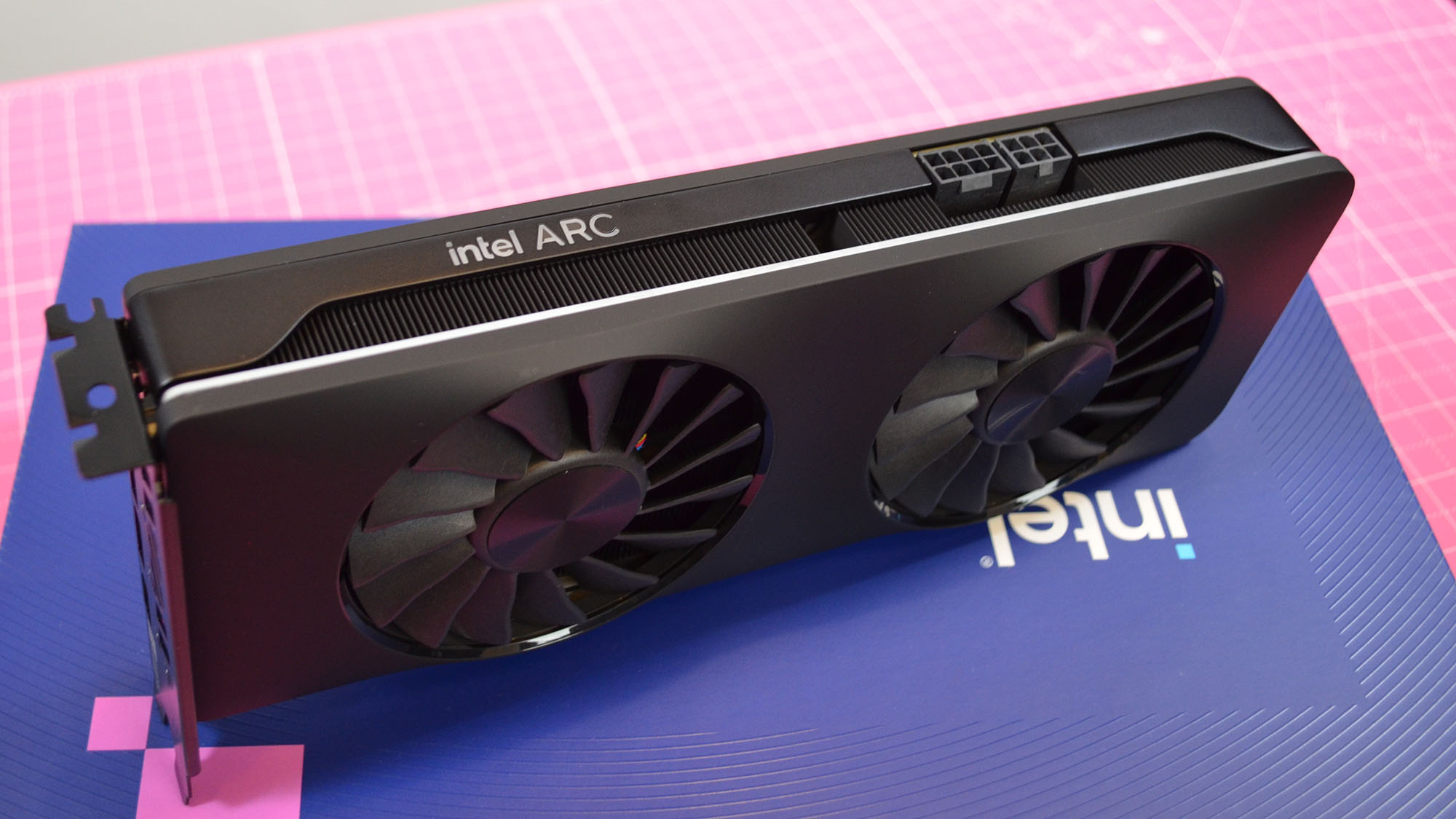
| Component | Intel Arc A750 |
|---|---|
| Price | $249.99 (about £200 / AU$375) |
| GPU | DG2-512 |
| Transistor count | 21.7 billion |
| TGP | 225W |
| Shader units | 3,584 |
| RT Cores | 28 |
| Tensor Cores | 448 |
| Base Clock | 2,050MHz |
| Boost Clock | 2,400MHz |
| VRAM | 8GB GDDR6 |
| Memory Clock | 2,000MHz, 16 Gbps effective |
| Bus Size | 256-bit |
| Memory Bandwidth | 512.0 GB/s |
Should you buy the Intel Arc A750?
| Attributes | Notes | Rating |
|---|---|---|
| Price | With the recent price drop to $249, the Arc A750 is one of the better budget GPUs by value on the market. | 4 / 5 |
| Specs | The specs on the Arc A750 are impressive for a first attempt at a discrete GPU, but it's power draw is very high. | 3 / 5 |
| Design | I absolutely love the look the A750 Limited Edition, even if it is a little big for this class of card. | 5 / 5 |
| Performance | When this card works, it works great, but it doesn't handle older DX9 and DX10 content well, and some games might not work at all, which is a major knock against it. | 2 / 5 |
Buy it if...
You're looking for a cheap GPU
At $249.99, this is one of the best cheap GPUs you're going to find.
You want a stylish looking card
This card is very cool looking in a way that Nvidia and AMD reference cards simply aren't.
You want strong ray tracing and upscaling
Not only do Intel's AI cores make XeSS upscaling a serious contender, the Arc A750's ray tracing performance is quite strong.
Don't buy it if...
You are concerned about compatibility
While only one game I tested wouldn't work, that's one game too many for many gamers out there.
You're concerned about power consumption
At 225W TGP, this card soaks up way more power than a card in this class reasonably should.
Intel Arc A750: Also consider
If my Intel Arc A750 has you considering other options, here are two more cards to consider...
| Intel Arc A750 | Nvidia GeForfce RTX 3060 12GB | AMD Radeon RX 6600 | |
|---|---|---|---|
| Price: | $249.99 (about £200 / AU$375) | $329 (about £265, AU$495) | $329 (about £265, AU$495) |
| Boost Clock | 2,400MHz | 1,777MHz | 2,491MHz |
| VRAM | 8GB | 12GB | 8GB |
| Memory Bandwidth | 512.0 GB/s | 360.0 GB/s | 224.0 GB/s |
| Shader units | 3,584 | 3,584 | 1,792 |
| Ray Tracing Cores | 28 | 28 | 28 |
| Tensor/AI Cores | 448 | 112 | 0 |
| TGP | 225W | 170W | 132W |
| Connector | 1x 6-pin + 1x 8-pin | 1 x 12-pin | 1 x 8-pin |
| Outputs | 1x HDMI 2.1, 3x DisplayPort 2.0 | 1x HDMI 2.1, 3x DisplayPort 1.4a | 1x HDMI 2.1, 3x DisplayPort 1.4a |
Nvidia GeForce RTX 3060 12GB
The Nvidia RTX 3060 is one of the best graphics cards out there for 1080p gaming, and it won't have any of the compatibility issues that the Arc A750 has. Just make sure to get the 12GB variant, since the 8GB version is the same price for less VRAM.
Read the full Nvidia GeForce RTX 3060 review
AMD Radeon RX 6600
The AMD RX 6600 is one of the best small form factor graphics cards you can find while still being powerful enough for most 1080p gaming on high settings.
Read the full AMD Radeon RX 6600 review
How I tested the Intel Arc A750
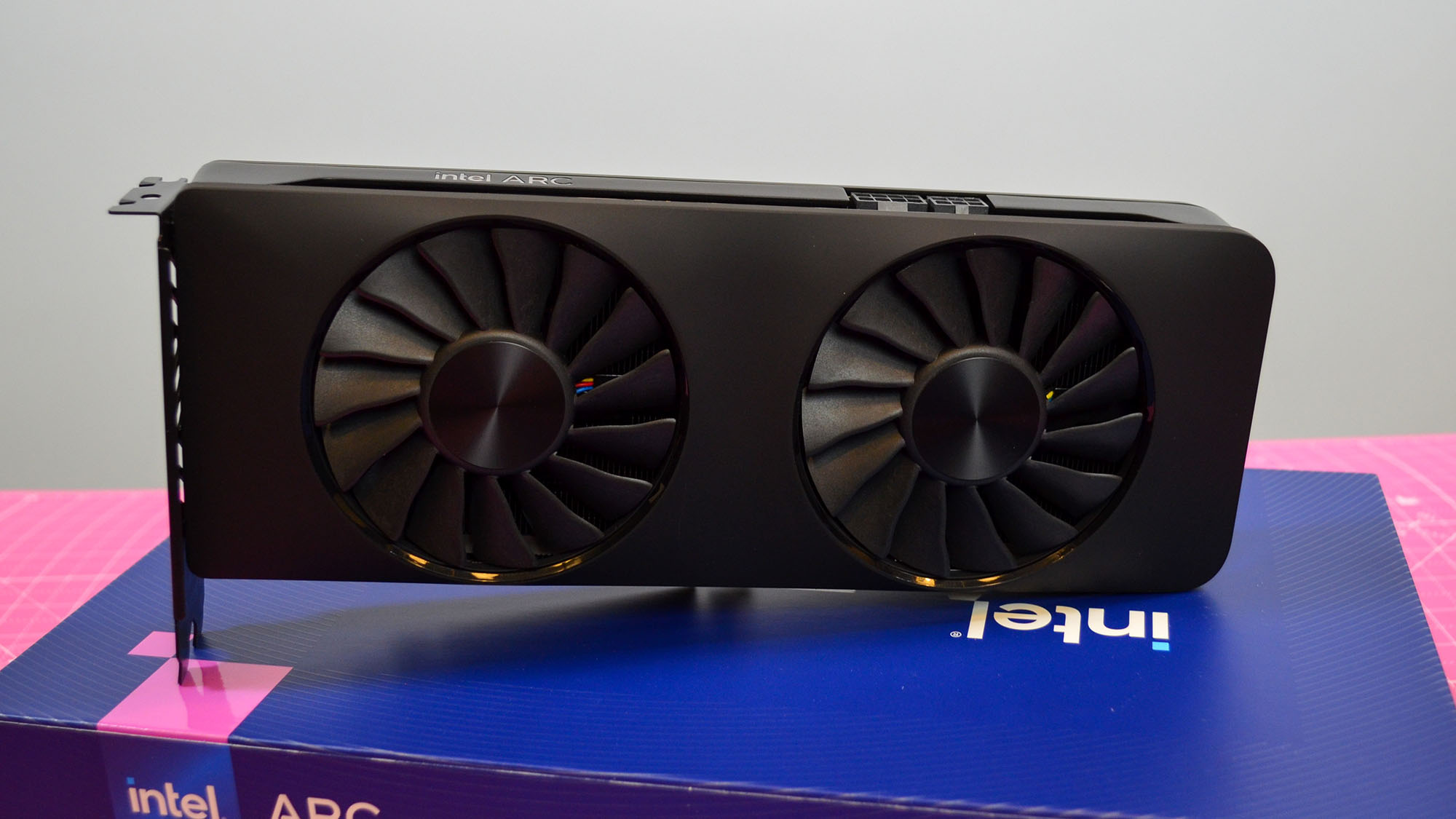
- I spent several days with the Intel Arc A750
- I used the A750 in my personal PC playing games and doing creative work
- I ran our standard battery of tests on the Arc A750
I spent several days with the Intel Arc A750 to test its gaming and creative performance, including at 1080p and 1440p. In addition to gaming, I ran our standard suite of GPU tests at it using the same system set up I use for all our graphics card tests.
Besides my extensive computer science education or practical experience, I have been a hardware reviewer for a few years now, and a PC gamer for even longer, so I know how well graphics cards are supposed to perform with a given set of specs.
First reviewed May 2023

John (He/Him) is the Components Editor here at TechRadar and he is also a programmer, gamer, activist, and Brooklyn College alum currently living in Brooklyn, NY.
Named by the CTA as a CES 2020 Media Trailblazer for his science and technology reporting, John specializes in all areas of computer science, including industry news, hardware reviews, PC gaming, as well as general science writing and the social impact of the tech industry.
You can find him online on Bluesky @johnloeffler.bsky.social
